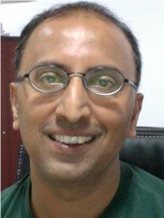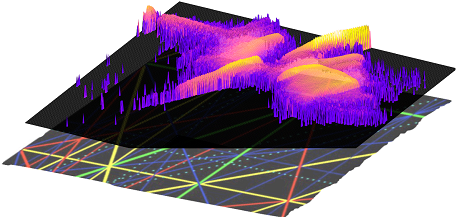










|
Title of Talk INTRAMOLECULAR VIBRATIONAL ENERGY FLOW VERSUS QUANTUM CONTROL
Abstract The dream of mode selective control of molecular processes apparently ended as soon as it was realized that the typical timescale for Intramolecular vibrational energy redistribution (IVR) is shorter than the timescale of the process being controlled[1]. Subsequently, coherent control techniques bypassed the entire issue of IVR and instead emphasized the key role played by quantum interferences[2]. However, recent studies[3] have shown that even in large molecules IVR is not an exponential process on the control timescales. Can one therefore actively control the IVR? To what extent are the quantum coherences crucial in determining the features of an optimal control field ? Can IVR in fact aid the control process? Answering these questions requires a clear and detailed understanding of the processes from a classical phase space perspective. In this talk I analyze a model system[4] which has the IVR versus quantum control paradigm in a minimal sense. Detailed insights into the classical dynamics will be provided with remarks about the potential quantum manifestations in terms of control with weak fields.
References: 1. Rice, S. A. Nature 2001, 409, 422 2. Shapiro, M.; Brumer, P. Principles of the Quantum Control of Molecular Processes; Wiley-Interscience, NJ, 2003 3. Gruebele, M.; Wolynes, P. G. Acc. Chem. Res. 2004, 37, 261. Bigwood, R.; Gruebele, M.; Leitner, D. M.; Wolynes, P. G. Proc. Natl. Acad. Sci. U.S.A. 1998, 95, 5960 4. Sethi, A.; Keshavamurthy, S. Mol. Phys. 2012, 110, 717 |
|
Srihari Keshavamurthy, Professor
Department of Chemistry Indian Institute of Technology Kanpur Kanpur – 208016, INDIA e-mail: srihari@iitk.ac.in
Profile. Srihari did his B. Sc. in Chemistry from Vivekananda College, University of Madras and a M. S. in Chemical Physics from Villanova University, USA. He obtained his Ph.D. in Chemical Physics at Berkeley under the supervision of William H. Miller and postdoctoral research with Gregory S. Ezra at Cornell. Srihari joined IITK in 1996. He has been a guest researcher at the University of Washington, Pullman USA with Steven L. Tomsovic, at University of Bristol with Steve Wiggins, Intitute of Theoretical Physics in University of Regensburg with Klaus Richter, and with the finite systems group at the Max Planck Institute for Physics of Complex Systems, Dresden. His research interests are in the field of chemical reaction dynamics with emphasis on the mechanisms of intramolecular vibrational energy flow, quantum control, and dynamical tunneling. The long term goal of his group is to establish the unreasonable effectiveness of classical dynamics in molecular systems using a classical-quantum correspondence based approach.
Selected Publications 1. Keshavamurthy, S., Adv. Chem. Phys. 2013, 153, 43 2. Manikandan, P; Semparithi, A; Keshavamurthy, S., J. Phys. Chem. A 2009, 113, 1717 3. Sethi, A; Keshavamurthy, S., J. Chem. Phys. 2008, 128, 164117 4. Semparithi, A; Keshavamurthy, S., J. Chem. Phys. (communication) 2006, 125, 141101 5. Keshavamurthy, S., Phys. Rev. E (rapid) 2005, 72, 045203 6. Keshavamurthy, S., Int. Rev. Phys. Chem. 2007, 26, 521 |

